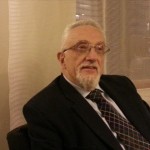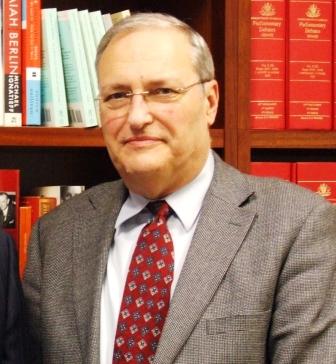This interview by Dr.Gerstenfeld of Efraim Zuroff, director of the Simopn Wiesenthal’s Jerusalem office, was recently published at Israel National News and republished here with the author’s consent.
THE BALTIC COUNTRIES, THE HOLOCAUST AND ANTI-SEMITISM
Manfred Gerstenfeld interviews Efraim Zuroff
 “Contemporary anti-Semitism in the Baltic countries draws on the dominant, classic anti-Semitic themes from before the Second World War. These include accusations about supposed Jewish control of the world economy, the banking system and the media.
“Contemporary anti-Semitism in the Baltic countries draws on the dominant, classic anti-Semitic themes from before the Second World War. These include accusations about supposed Jewish control of the world economy, the banking system and the media.
“In recent decades, new manifestations of anti-Semitism have been added. The most sensitive issues in contemporary Jewish-Baltic countries’ relations concern the Holocaust. They also include the way these issues have been dealt with since 1990/1991 when Lithuania, Latvia, and Estonia regained their independence.”
Efraim Zuroff is Director of the Simon Wiesenthal Center (SWC) in Israel. He is widely known as “the Last Nazi Hunter.” Zuroff has spent much of his professional life searching for Nazi war criminals and evidence needed to convict them.
He observes, “One major historical question concerns Holocaust crimes in which local Nazi collaborators in all three countries participated. Lithuanians, Latvians and Estonians murdered both their Jewish neighbors, as well as foreign Jews deported to their countries to be killed. Baltic security police units were also sent elsewhere, primarily to Belarus and Poland, to assist in the murder of Jews there.
“The greatest friction with these countries is caused by the lack of prosecution and punishment of local Nazi war criminals, the issue of communal and personal restitution and conflicting narratives of events during World War II. The Baltic countries view those locals who opposed Communism as heroes, regardless of whether they murdered Jews and/or supported the Nazis.
“The only difference in attitude between the three Baltic countries is the scope and intensity of the above issues. It is linked to the size of the pre-war Jewish communities, their importance within their society, as well as in the Jewish world. After the return of Vilna and its environs to Lithuania in the fall of 1939, about a quarter of a million Jews lived in the country. At the time there were 90,000 Jews in Latvia and 4,500 in Estonia.
“None of the Baltic countries have honestly confronted their participation in Holocaust crimes. They do not incorporate in their Holocaust education programs accurate facts about the involvement of local collaborators in the murders, including the extensive scope of their participation, the fact that all of them were volunteers, the incredible cruelty displayed in numerous instances, as well as the fact that these murders were motivated primarily by patriotism.
“In those rare cases in which local participation is acknowledged, it is usually attributed solely to criminal or marginal elements, even though the collaboration with the Nazis in the murder of Jews encompassed all strata of Baltic society, a phenomenon especially noteworthy in Lithuania. With this comes the mistaken identification of all Jews with the hated Communists.
“The situation in Lithuania differs from that of Latvia and Estonia, where there are numerically-significant Russian minorities. They have clear political agendas. They staunchly oppose local efforts to rewrite the history of World War II and the Holocaust, as well as to hide the crimes of local Nazi collaborators. In Latvia and Estonia, the local Russian-language media give strong expression to this opposition. There are however, no ethnic Latvians and Estonians who are partners on these issues. The local ethnic press also has consistently followed a ‘patriotic,’ and strongly nationalistic line. All three countries allow the celebrations of surviving Nazis, Neo-Nazis and ultra-nationalists to take place.
“A related source of conflict is the publication of the Prague Declaration. It promotes the canard of equivalency between Nazi and Communist crimes and calls for a wide range of steps. The Declaration refuses to acknowledge the uniqueness of the Holocaust, which is based on the totality of a scheme by the Nazis to annihilate the Jewish people. Never had such a plan been devised against any other people, let alone even attempted. A second unique characteristic of the Shoah is the manner in which it was implemented – by industrial mass murder, unprecedented in human history. Lithuania in particular played a major role in the creation and promotion of the Prague Declaration. Its presidency of the European Union which will begin on July 1, 2013, could therefore be highly problematic.
“The Jewish communities are small. In Lithuania there are 3,500-4,000 Jews. In Latvia there are between 10,000 and 12,000 and in Estonia 3,500. In the latter two countries, most of the Jews living there were born elsewhere. These communities hardly play any role in their local societies.
“For the most part, there has heretofore been no connection whatsoever between the dismal record of the three Baltic countries on Holocaust-related issues, the existence of local ‘classic’ anti-Semitism and any sort of anti-Zionism. The extreme right which incites against Jews, has little political power. Yet in Lithuania, it has some influence on the mainstream parties concerning their nationalist agenda.
“As far as anti-Israel sentiment in the Baltics goes, it is often expressed in comments on Internet news portals, but the catalysts for such hostility or unfair criticism of Israel are almost invariably Holocaust-related issues. There have so far been no major differences between the various Baltic political parties when it comes to issues of concern to Israel. On the contrary, these countries have consistently sought close political and commercial ties with Israel. It is both ironic and sad that Israel’s almost total refusal to criticize them on their poor record on Shoah-related issues, may have paved the way for good relations with all three Baltic countries.”

